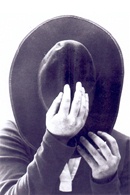All Nonfiction
- Bullying
- Books
- Academic
- Author Interviews
- Celebrity interviews
- College Articles
- College Essays
- Educator of the Year
- Heroes
- Interviews
- Memoir
- Personal Experience
- Sports
- Travel & Culture
All Opinions
- Bullying
- Current Events / Politics
- Discrimination
- Drugs / Alcohol / Smoking
- Entertainment / Celebrities
- Environment
- Love / Relationships
- Movies / Music / TV
- Pop Culture / Trends
- School / College
- Social Issues / Civics
- Spirituality / Religion
- Sports / Hobbies
All Hot Topics
- Bullying
- Community Service
- Environment
- Health
- Letters to the Editor
- Pride & Prejudice
- What Matters
- Back
Summer Guide
- Program Links
- Program Reviews
- Back
College Guide
- College Links
- College Reviews
- College Essays
- College Articles
- Back
Magic: A Disappearing Act
It's 11:00 on a Wednesday night. My chemistry textbook lies open on the desk, and, while molecular bonds are interesting, right now, my focus is on my hands. Red Bicycle Rider Back cards fly through the air as I spring them from hand to hand, executing intricate sleight of hand moves in between. The sea of undone homework and textbooks on the table remind me to put the cards down, but my love of magic, already 7 years in the making, urges me to keep practicing. Procrastination at its finest.
While I was introduced to magic at age 9, today, audiences worldwide are getting their taste of magic through more and more performances on TV, social media, and even on our streets. Yet, although magic seems to be on an unstoppable rise, the art is dying at its core.
According to professional magician and Youtuber, Chris Ramsay, right now, the popularity of magic is increasing “exponentially.” And with this new popularity and media attention, audiences of the art are “evolving,” says Chris. The more magic people are exposed to, the more methods and patterns they begin to become aware of, and the less they are fooled.
Magic has started to be trivialized as a skill used to do one thing𑁋leave an audience scratching their heads. As stated by the online database, IMDB, Penn and Teller Fool Us is within the top 30 game shows of all time. On the show, aspiring magicians attempt to fool famous magicians Penn and Teller with an original trick, and if they are successful, they get a trophy. So, even though a magician may deliver an entertaining routine to an audience, if Penn and Teller are not fooled, the magician is seen as negligible. Penn and Teller Fool Us categorizes magic as an art that is supposed to deceive but not necessarily entertain. And, as the show continues to grow in popularity, this mindset will gradually be adopted by the audience as well.
Recently, Shin Lim, Canadian magician and two-time winner of the national competition, America’s Got Talent, is quoted in an NPR article from January as saying that he prefers to be called a “sleight of hand artist,” rather than a magician. While intriguing, this title implies that Shin’s performances are more focused on his slyness rather than creating magic and wonder for an audience. Magic is no longer a vehicle for entertainment and wonder. It’s just a puzzle presented to an audience who must solve it.
This new catch-me-if-you-can mentality, however, is problematic and fails to capture what magic is all about. As stated by famous illusion maker, Jim Steinmeyer, “the art of a magician is not found in simple deception,” but rather in “the construction of a reality which supports the illusion.” A true advocate for magic today and believer of this philosophy is the aforementioned magician, Chris Ramsey, who views his job as simply “taking the audience out for a spin,” and using magic to tell a story rather than to just deceive.
More magicians need to follow suit, return to the basics, and market themselves not as tricksters trying to sleight an audience, but as performers that can provide audiences a wondrous and joyful escape from the stresses of everyday life. Putting this into practice is London doctor, Mahesh Chhaya. Recently, Dr. Chhaya has been using his skills as a magician to both entertain and help people maintain strong mental health during the COVID-19 lockdown. According to Dr. Chhaya, he decided, “why not use something so powerful such as magic to give a healthcare message.” Dr. Mahesh Chhaya still continues to upload social media magic videos to his twitter, Drmagicmagician, that astonish viewers, but more importantly, inform them about the pandemic and well-being.
As magic continues to grow, audiences will eventually come to a baseline understanding of how popular tricks work. And, while select magicians like Chris Ramsey and Mahesh Chhaya may be advocating for a new way to amaze audiences, if the magic community as a whole fails to react, the methods will simply not be able to keep the art that I have come to love alive.

Similar Articles
JOIN THE DISCUSSION
This article has 0 comments.

Salutations! I am a high school junior from San Antonio, Texas, and this is an opinion piece I wrote about one of my greatest hobbies, magic. As an avid fan and performer of magic, I began reflecting on the art and its current place in society. While magic is growing in popularity, it is also gradually losing some of its key elements in order to adapt to a new audience. After having 10 years of experience under my belt and regularly performing magic (in person and virtually) at local children's hospitals and nursing homes, I have realized how magic is oversimplified when presented in the mainstream.